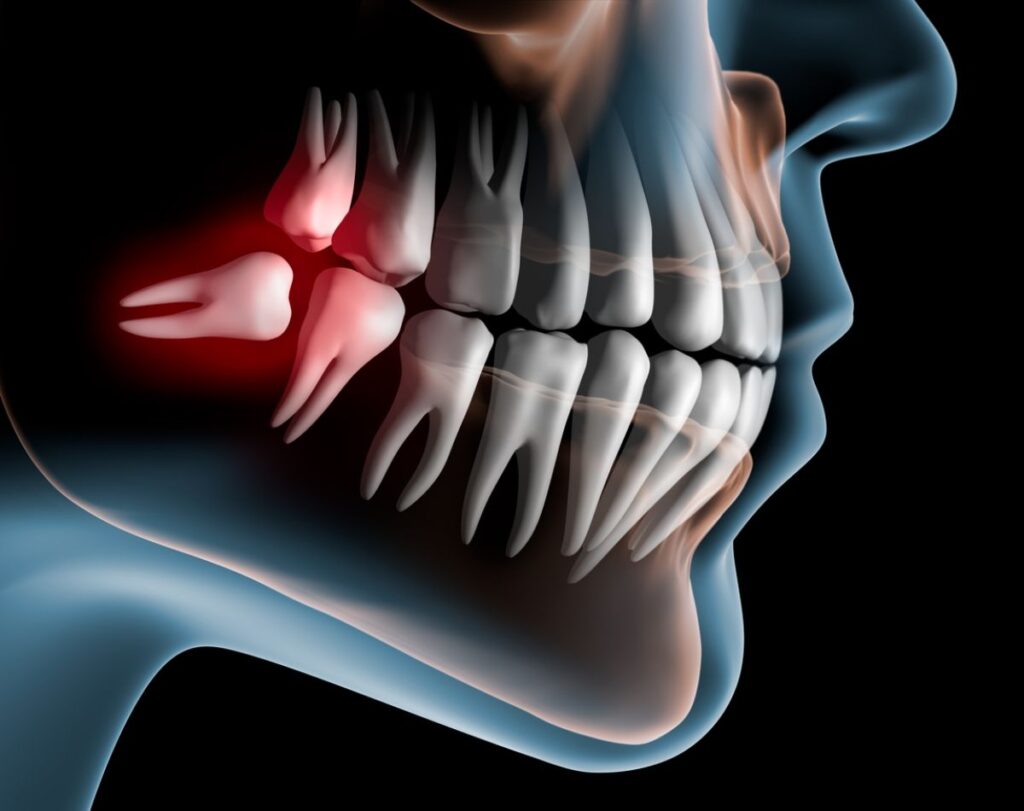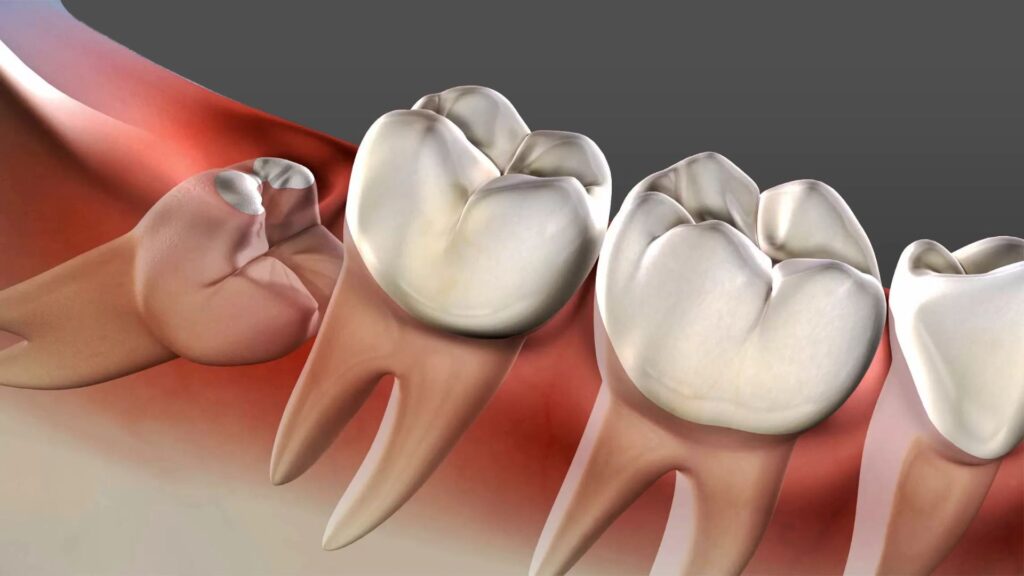Wisdom teeth, those pesky molars at the back of your mouth, can bring a whole lot of pain when they decide to appear. Whether a sudden sharp ache or a lingering throb, wisdom tooth pain shouldn’t be ignored. Let’s dive into understanding why they’re a problem and, most importantly, how to get relief.
Wisdom Tooth Pain Basics
- Wisdom teeth: Last molars, often erupt with problems.
- Causes: Not enough space, infection.
Home Care:
- Pain meds (ibuprofen, etc.)
- Saltwater rinse
- Ice for swelling
- Soft foods
See a Dentist IF:
- Pain is severe
- Swelling, fever, bad breath
- Other teeth are affected
Why a Dentist?
- Diagnose the exact problem
- Offer the right treatment
- Prevent serious issues
Don’t Suffer: Get wisdom tooth pain treated for lasting relief at A & A Dental Clinic Vancouver!
What Causes Wisdom Tooth Pain?

Your wisdom teeth typically try to emerge in your late teens or early twenties. Here’s why they often come with a side of discomfort:
-
Impaction:
Your jaw might not offer enough space for those extra teeth. They get stuck (impacted), unable to grow in properly. This causes pressure on surrounding teeth, nerves, and your jawbone, leading to pain.
-
Infection:
Partially erupted wisdom teeth create flaps of gum tissue – the perfect hideout for bacteria. Infection leads to inflammation, swelling, a bad taste in your mouth, and even more pain.
-
Other Causes:
Sometimes, even wisdom teeth with room to erupt can cause pain due to decay, or if they push against other teeth, creating misalignment.
Home Remedies for Wisdom Tooth Pain
When wisdom tooth pain strikes, try these home remedies for temporary relief and to manage symptoms while you wait for your dental appointment:
-
Over-the-Counter (OTC) Pain Relief:
Ibuprofen (like Advil or Motrin) or acetaminophen (like Tylenol) are effective at reducing inflammation and pain. Follow the recommended dosage on the label.
-
Saltwater Rinse:
This classic remedy has natural soothing properties. Dissolve ½ teaspoon of salt in a glass of warm water. Swish gently around the affected area for 30 seconds, several times a day. The salt helps combat bacteria and reduce swelling.
-
Ice Packs:
Apply an ice pack (wrapped in a towel) to the side of your face where you’re experiencing pain. Keep it on for 15 minutes, then off for 15 minutes. Repeat as needed. The cold helps numb pain and reduce inflammation.
-
Clove Oil:
Clove oil possesses a mild numbing effect. Dilute a few drops with a carrier oil (like coconut oil) and apply it directly to the painful gum area with a cotton swab. Do this a few times a day for temporary relief.
-
Soft Food Diet:
Avoid hard, chewy, or crunchy foods that put pressure on your teeth and gums. Stick to soft options like soups, mashed potatoes, oatmeal, yogurt, smoothies, and scrambled eggs, until your pain subsides.
-
Proper Oral Hygiene:
Even with pain, it’s important to maintain good brushing and flossing habits (carefully around the sore area). This helps prevent further infection.
Important Note: Home remedies are designed to provide temporary relief for mild to moderate wisdom tooth pain. If your symptoms are severe or don’t improve, it’s essential to see your dentist for a diagnosis and proper treatment plan.
When is it Time for the Dentist?
Home remedies offer temporary relief for mild wisdom tooth discomfort. However, there are specific situations where seeing your dentist becomes absolutely essential:
-
Intense or Persistent Pain:
If over-the-counter pain relievers don’t make a dent in your pain, or the discomfort keeps coming back, it’s time for a professional assessment.
-
Swelling and Difficulty Opening Your Mouth:
Significant swelling in your jaw, face, or difficulty opening your mouth can indicate a serious infection or the need for tooth removal. Seek dental help right away.
-
Signs of Infection:
Fever, pus, bad breath, or swollen lymph nodes in your neck are all signs of a spreading infection that needs prompt treatment.
-
Bleeding Gums:
Bleeding around the wisdom tooth area can indicate infection or other gum issues that your dentist needs to address.
-
Damage to Other Teeth:
If your wisdom tooth is pushing against other teeth, causing visible shifting or pain, a dentist can assess if extraction is needed to prevent further damage.
-
Preventative Care:
Even if you don’t currently feel pain, regular dental check-ups can catch wisdom tooth problems early, sometimes even before they erupt, making treatment easier.
Remember: Putting off a dentist visit with severe wisdom tooth pain could lead to complications. Don’t hesitate to seek professional care when home remedies aren’t enough.
Why Choose a Dental Visit?

Your dentist is your wisdom tooth whisperer. Specially when we are talking about Wisdom Tooth Pain. Here’s how they can help:
-
X-rays:
The Key to Unlocking the Mystery: Dental x-rays provide a clear picture of your wisdom teeth, showing their exact position, angle, and if they’re impacting other teeth or bone. This information is crucial for a proper diagnosis.
-
Diagnosis:
Getting to the Root of the Problem: Your dentist will examine your mouth and review your x-rays to determine the specific cause of your pain. Is it impaction, infection, decay, or something else? An accurate diagnosis guides the right treatment approach.
-
Treatment Plan:
Your Road to Relief: Based on the diagnosis, your dentist will develop a personalized treatment plan. This could include:
-
-
Professional Cleaning:
-
If infection is present, a deep cleaning around the wisdom tooth can help reduce inflammation and clear out bacteria.
-
-
Antibiotics:
-
For severe infections, antibiotics might be needed to fight the bacteria and prevent it from spreading.
-
-
Filling a Cavity:
-
If a partially erupted wisdom tooth has developed a cavity, a filling might be possible to restore it.
-
-
Extraction:
-
If the tooth is severely impacted, infected, or causing damage, extraction (removal) may be the best option for long-term relief.
Benefits of a Dental Visit for Wisdom Tooth Pain:
-
-
Accurate Diagnosis:
-
Self-diagnosing wisdom tooth pain is tricky. Wisdom tooth issues can mimic other dental problems like tooth decay or gum disease. A dentist has the expertise and tools (like x-rays) to pinpoint the exact cause, ensuring you get the right treatment.
-
-
Tailored Treatment:
-
Your treatment plan addresses YOUR specific needs, not a generic solution. The best approach depends on the severity of impaction, the presence of infection, and your overall oral health. Your dentist will create a plan that provides the most effective relief for your unique situation.
-
-
Prevent Complications:
-
Early intervention with impacted or infected wisdom teeth can prevent more serious problems down the line. Left untreated, wisdom teeth issues can lead to:
-
-
- Damage to neighboring teeth: Impacted wisdom teeth can push other teeth out of alignment or cause root damage.
- Cysts: Fluid-filled sacs can form around impacted teeth, damaging bone and nerves.
- Severe infections: These can spread to other areas of your head and neck.
-
Expert Care:
-
Procedures like tooth extraction are safest and most comfortable when performed by a dental professional. Dentists have the training, experience, and sterile environment to handle extractions with minimal discomfort and ensure proper healing. They can also provide anesthesia options to manage pain during the procedure.
Say Goodbye to Wisdom Tooth Pain

Wisdom tooth troubles are common, but you don’t have to suffer endlessly. A mix of smart home care and a dental visit when needed will put you on the path to relief. Here’s why it’s important to address this issue:
- Prevent Further Damage: Impacted wisdom teeth can harm neighboring teeth, your jawbone, or nerves. Addressing the problem early saves you from more serious complications down the road.
- Long-Term Relief: While home remedies are great for temporary pain management, a dental visit will identify the root cause and offer a lasting solution.
- Improved Oral Health: Addressing wisdom teeth issues contributes to your overall oral health and helps prevent future infections and discomfort.
- Peace of Mind: Knowing that your wisdom teeth are properly assessed and treated will alleviate anxiety and let you enjoy life without worrying about those molars!
Vancouver Residents: We’re Here to Help
If you’re in the Vancouver area and suspect wisdom tooth woes, A&A Dental Clinic Vancouver is your partner in finding a solution. Don’t hesitate to reach out and schedule an appointment. If you need any Extractions & Wisdom Teeth Removal services, A&A Dental Clinic has a specialist to help you!
As a Vancouver resident, it’s important to find health information that’s tailored to Canadian regulations and practices. The Canadian Dental Association (CDA) is a fantastic resource for all things related to oral health, including wisdom teeth. Their website offers insights specifically relevant to Canadian dental care, so you know you’re getting accurate and up-to-date advice.
Book your consultation today with A & A Dental Clinic Vancouver.






